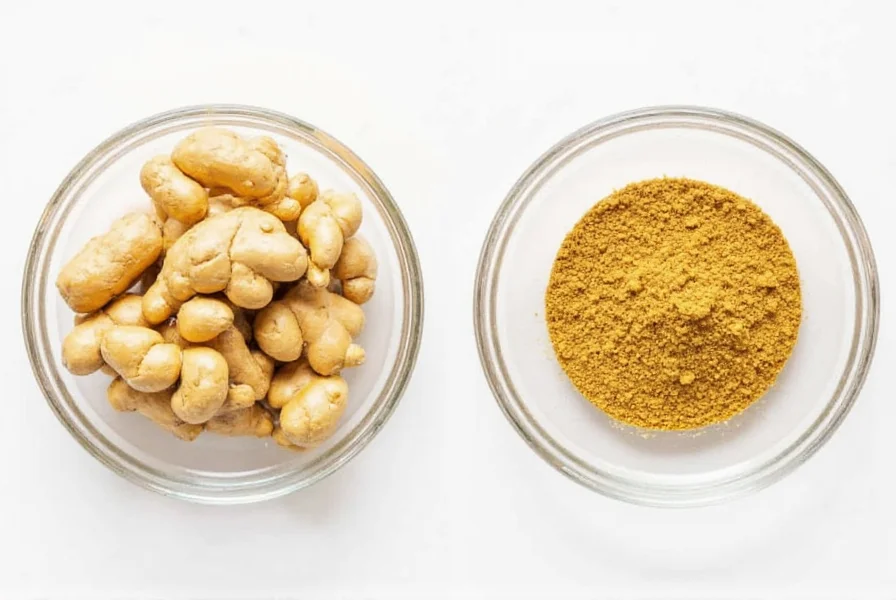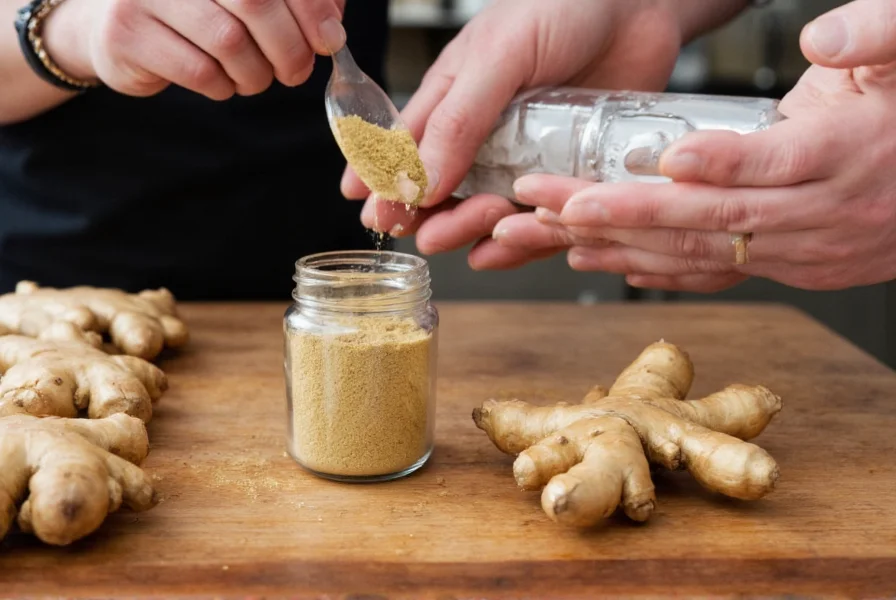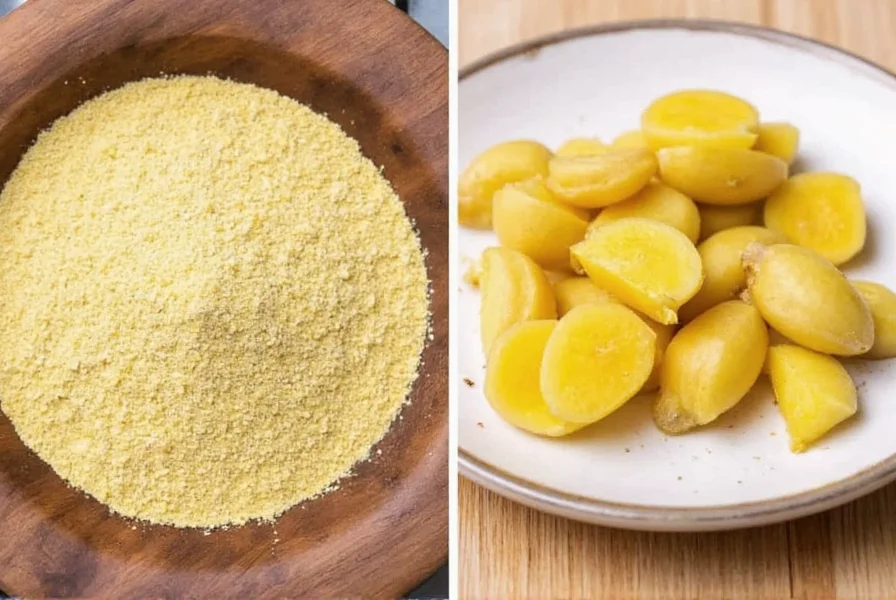When comparing dry ginger versus fresh ginger, understanding their distinct properties helps maximize both culinary and health benefits. These two forms of the same rhizome serve different purposes in the kitchen and medicine cabinet due to processing methods that alter their chemical composition and physical characteristics.
What Exactly Are Dry Ginger and Fresh Ginger?
Both originate from the Zingiber officinale plant's underground stem, but undergo different preparation processes. Fresh ginger refers to the raw, unprocessed root with its characteristic knobby appearance and thin brown skin. Dry ginger, also called ginger powder or ginger root powder, results from peeling, slicing, and dehydrating fresh ginger until moisture content drops below 10%, then grinding into fine particles.
This fundamental processing difference creates variations in potency, flavor profile, and application suitability that home cooks and health-conscious consumers should understand when deciding between dried ginger root and fresh ginger root for specific purposes.

Nutritional Composition Comparison
The dehydration process concentrates certain compounds while diminishing others. Understanding the nutritional differences between dried ginger and fresh ginger helps determine which form better serves specific health goals.
| Nutrient (per 10g) | Dry Ginger | Fresh Ginger |
|---|---|---|
| Calories | 39 kcal | 8 kcal |
| Gingerol content | 18-20 mg | 10-12 mg |
| Shogaol content | Higher (from dehydration) | Lower |
| Moisture content | <10% | 80-85% |
| Vitamin C | Traces | Significant amount |
| Fiber | 2.0g | 0.2g |
Flavor Profile Differences Explained
Fresh ginger delivers a bright, citrusy heat with subtle floral notes that dissipates quickly. Its moisture content creates a sharper initial bite that mellows during cooking. Dry ginger powder offers a more earthy, concentrated warmth with less citrus notes but greater staying power in dishes. The drying process converts some gingerol to shogaol, creating a different flavor compound profile that many describe as deeper and more intense.
Professional chefs often recommend using fresh ginger for raw applications like juices and salads where its vibrant flavor shines, while dry ginger works better in baked goods and spice blends where its concentrated flavor distributes evenly throughout the dish. Understanding when to use ground ginger versus fresh ginger can dramatically impact your culinary results.
Health Benefits: Which Form Offers More Therapeutic Value?
Both forms provide significant health benefits, but their applications differ. Dry ginger contains higher concentrations of gingerol (the primary bioactive compound) by weight due to moisture removal, making it more potent for medicinal applications. Studies show dry ginger powder demonstrates stronger anti-inflammatory effects in certain contexts, particularly for digestive issues and nausea relief.
However, fresh ginger contains additional volatile oils and enzymes that degrade during drying. These compounds contribute to fresh ginger's superior effectiveness for immediate sore throat relief and certain respiratory conditions. The comparison of health benefits between dry ginger and fresh ginger reveals complementary rather than competitive advantages.
For those researching which is better for inflammation dry ginger or fresh ginger, research suggests dry ginger's concentrated compounds may offer more consistent anti-inflammatory effects, though fresh ginger provides broader phytochemical diversity.
Culinary Applications: When to Use Each Form
Chef recommendations consistently highlight specific uses where each form excels:
- Fresh ginger shines in: Stir-fries, marinades, fresh juices, salad dressings, and seafood dishes where its bright flavor complements delicate ingredients
- Dry ginger excels in: Baked goods, spice rubs, chai blends, long-simmered sauces, and medicinal teas where its stable flavor withstands extended cooking
Many professional kitchens maintain both forms for different applications. When substituting one for the other, remember that 1 tablespoon fresh ginger equals approximately 1/4 teaspoon dry ginger powder due to concentration differences. This conversion ratio matters significantly when following recipes that specify dry ginger powder vs fresh ginger measurements.
Storage Considerations and Shelf Life
Proper storage dramatically affects both forms' usability. Fresh ginger root stored in a paper bag in the refrigerator's crisper drawer maintains quality for 2-3 weeks. For longer storage, freeze whole or grated in an airtight container for up to six months. Dry ginger powder retains potency for 2-3 years when stored in an airtight container away from light and heat.
The shelf life comparison between dry ginger and fresh ginger shows why many home cooks keep dry ginger as a pantry staple while treating fresh ginger as a perishable ingredient. Understanding how long does dry ginger last compared to fresh helps prevent waste and ensures optimal flavor in your dishes.
Making the Right Choice for Your Needs
Selecting between dry and fresh ginger depends on your specific application:
- Choose dry ginger when you need: Long shelf life, concentrated medicinal effects, consistent flavor in baked goods, or convenience in spice blends
- Choose fresh ginger when you need: Bright flavor in raw applications, immediate soothing effects for sore throats, or moisture content for juicing
For those wondering is dry ginger as good as fresh ginger, the answer depends entirely on context. Neither form is universally superior - they serve different purposes based on your specific culinary or health requirements. Many health practitioners recommend keeping both forms available to maximize benefits across different applications.

Conclusion: Complementary Forms for Different Applications
The dry ginger versus fresh ginger debate ultimately reveals two valuable forms of the same beneficial plant. Understanding their distinct properties allows you to leverage each form's strengths rather than viewing them as competitors. By recognizing when to use dry ginger powder versus fresh ginger root, you can optimize both flavor profiles in cooking and therapeutic benefits for health applications.
Frequently Asked Questions
Which has more health benefits, dry ginger or fresh ginger?
Dry ginger contains higher concentrations of gingerol by weight due to moisture removal, making it more potent for certain medicinal applications like digestive issues. However, fresh ginger provides additional volatile compounds that degrade during drying, offering broader phytochemical diversity. For specific conditions like immediate sore throat relief, fresh ginger may be more effective, while dry ginger shows stronger anti-inflammatory effects in some studies.
Can I substitute dry ginger for fresh ginger in recipes?
Yes, but with important conversion considerations. Generally, 1/4 teaspoon of dry ginger powder equals 1 tablespoon of freshly grated ginger. The substitution works best in cooked dishes rather than raw applications, as dry ginger lacks the bright, citrusy notes of fresh ginger. For recipes specifically highlighting ginger's fresh flavor (like juices or ceviche), substitution isn't recommended.
Which form is better for reducing inflammation?
Research suggests dry ginger may offer more consistent anti-inflammatory effects due to its higher concentration of gingerol compounds. The dehydration process converts some gingerol to shogaol, which demonstrates potent anti-inflammatory properties. However, fresh ginger provides additional compounds that may contribute to overall anti-inflammatory effects through different mechanisms. For therapeutic use, many practitioners recommend standardized dry ginger extracts for consistent dosing.
How should I store dry ginger to maintain potency?
Store dry ginger powder in an airtight container away from light, heat, and moisture. A dark cupboard maintains potency for 2-3 years. Avoid storing near the stove or in refrigerator doors where temperature fluctuations occur. For maximum shelf life, consider dividing larger quantities into smaller containers to minimize exposure to air each time you use it.











 浙公网安备
33010002000092号
浙公网安备
33010002000092号 浙B2-20120091-4
浙B2-20120091-4